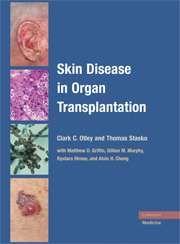Book contents
- Frontmatter
- Contents
- List of Contributors
- Foreword by Daniel R. Salomon
- Foreword by Robin Marks
- Foreword by Kathy Schwab
- Preface
- Acknowledgments
- SECTION ONE TRANSPLANT DERMATOLOGY: AN EVOLVING DYNAMIC FIELD
- Section Two Transplant Medicine and Dermatology
- Section Three Pathogenic Factors in Transplant Dermatology
- Section Four Cutaneous Effects of Immunosuppressive Medications
- Section Five Infectious Diseases of the Skin in Transplant Dermatology
- 11 Bacterial Diseases in Organ Transplant Recipients
- 12 Fungal Diseases in Organ Transplant Recipients
- 13 Viral Diseases in Organ Transplant Recipients
- 14 Mycobacterial Diseases in Organ Transplant Recipients
- Section Six Benign and Inflammatory Skin Diseases in Transplant Dermatology
- Section Seven Cutaneous Oncology in Transplant Dermatology
- Section Eight Special Scenarios in Transplant Cutaneous Oncology
- Section Nine Educational, Organizational, and Research Efforts in Transplant Dermatology
- Index
14 - Mycobacterial Diseases in Organ Transplant Recipients
from Section Five - Infectious Diseases of the Skin in Transplant Dermatology
Published online by Cambridge University Press: 18 January 2010
- Frontmatter
- Contents
- List of Contributors
- Foreword by Daniel R. Salomon
- Foreword by Robin Marks
- Foreword by Kathy Schwab
- Preface
- Acknowledgments
- SECTION ONE TRANSPLANT DERMATOLOGY: AN EVOLVING DYNAMIC FIELD
- Section Two Transplant Medicine and Dermatology
- Section Three Pathogenic Factors in Transplant Dermatology
- Section Four Cutaneous Effects of Immunosuppressive Medications
- Section Five Infectious Diseases of the Skin in Transplant Dermatology
- 11 Bacterial Diseases in Organ Transplant Recipients
- 12 Fungal Diseases in Organ Transplant Recipients
- 13 Viral Diseases in Organ Transplant Recipients
- 14 Mycobacterial Diseases in Organ Transplant Recipients
- Section Six Benign and Inflammatory Skin Diseases in Transplant Dermatology
- Section Seven Cutaneous Oncology in Transplant Dermatology
- Section Eight Special Scenarios in Transplant Cutaneous Oncology
- Section Nine Educational, Organizational, and Research Efforts in Transplant Dermatology
- Index
Summary
MYCOBACTERIAL SKIN INFECTION IN ORGAN TRANSPLANT RECIPIENTS – EPIDEMIOLOGY, DIAGNOSIS, AND TREATMENT
Infections caused by mycobacteria occur not only in the early posttransplant period, during the time of the most intensive immunosuppression, but also in the late posttransplant period. They may be due to “typical” mycobacteria, M.tuberculosis, or atypical (or nontuberculous [NTM]) mycobacteria. Mycobacteria are acid-fast, nonmotile, weakly Gram-positive rods. NTM are ubiquitous environmental organisms with generally no attributable pathogenicity. Infection with M. tuberculosis, and in some cases with NTM, is not necessarily a sign of immunosuppression, but, particularly for NTM, depends on individual susceptibility. M.tuberculosis is acquired primarily by inhalation of aerosolized droplets containing the organisms, leading to an infection of the respiratory tract, with subsequent dissemination via the lymphatic system and the bloodstream. NTM comprise slow- and rapidly growing organisms, including M.marinum, M.kansasii, M.avium-intracellulare complex, M.xenopi, M.ulcerans (which causes Buruli ulcer, a chronic progressive disease and important health problem in West African countries), M.fortuitum, M.chelonae, and M.abscessus.
Epidemiology
There are very few epidemiological data on mycobacterial infections in solid organ transplant recipients. Infections with M.tuberculosis are uncommon in developed countries; however, these infections are increasing among foreign-born individuals in these countries. Mycobacterial infections seem to be rare in transplant patients, particularly in populations with a low prevalence of the disease. In developed Western countries the reported prevalence of tuberculosis in renal transplant recipients ranges from 0.35 to 4%. In developing countries the reported prevalence is much higher, occurring in up to 15% of transplant recipients in endemic areas.
- Type
- Chapter
- Information
- Skin Disease in Organ Transplantation , pp. 106 - 110Publisher: Cambridge University PressPrint publication year: 2008



